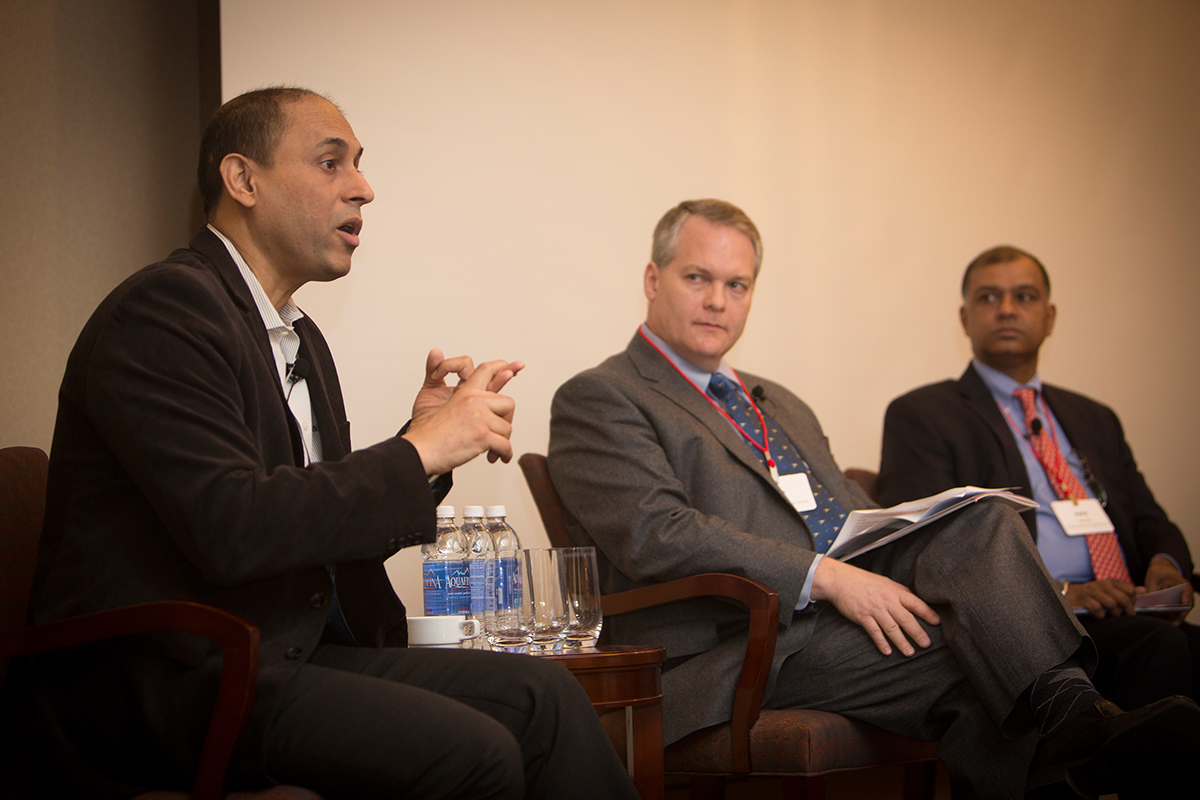Entrepreneurship to play 'essential' role in College of Business
By Susan Kelley

With entrepreneurship faculty and classes now scattered across campus, the nascent College of Business is poised to act as the focal point for entrepreneurship-related academics at Cornell, coordinating scholarship and teaching activities that will become an essential aspect of the college’s strength and coordinating them with activities in other colleges, administrators said.
On a public stage together for the first time, the college leadership spoke about the ways in which the College of Business will boost entrepreneurship academics at Cornell.
“We have the ability to combine talent, ideas, professors and students with unique resources and professional networks that will really help to push entrepreneurship to an even higher level at the university. I do expect to see a greater focus in the college on entrepreneurship,” said College of Business Dean Soumitra Dutta April 14 at the Entrepreneurship at Cornell’s Celebration conference at the Statler Hotel.
Nonacademic entrepreneurship activities are flourishing at Cornell, and academic activities will need to ramp up to add value to them, added Chris Barrett, the college’s deputy dean and dean of academic affairs. “We can do that much more effectively from a College of Business platform than we can do from the three schools’ platforms that we had previously,” he said.
Rohit Verma, the college’s dean of external relations, pointed out that the college’s combined faculty will have the expertise needed to educate students about the ways in which entrepreneurship is redefining the hospitality industry and other industries.
As examples he cited Uber, Airbnb and Flatbook, which combines the Airbnb concept with aspects of the traditional hospitality sector. “All of these are entrepreneurship activities which require the components of hospitality, but beyond that, understanding of technologies, analytics and business models. Such a rapidly evolving business landscape requires transdisciplinary collaboration among curriculum offered by the three schools and cannot be effectively addressed by a small faculty that specializes in only one aspect of academia,” Verma said.
Any investment that offers significant returns comes with risk, and the College of Business is no different, Dutta said. If the college fails to create a collaborative environment among the three schools, it will be built on a weak foundation, he said. However, the college leadership is aware of these and other risks and is working hard to mitigate them, with the help of seven faculty and staff advisory committees formed to help shape the college, Dutta said.
Although there are no firm plans for what entrepreneurship exactly will look like at the college, Dutta said the leadership will be devoting serious attention and resources to develop this area during the first year of the school’s existence.
He invited the conference attendees to join in that effort. “I do expect that the College of Business will become the focal point for entrepreneurship at the university. And to help it develop in the way that together we’d like to see it, we have to work on it collectively,” Dutta said.
Administrators outline next steps for College of Business
Dean Soumitra Dutta and Acting President and Provost Michael Kotlikoff, co-chairs of the College of Business Steering Committee, have outlined the next steps toward shaping the college.
On April 11 they sent a memo confirming that the college’s advisory committees will submit their recommendations to the Steering Committee by April 15. The Faculty Governance Committee, which is addressing structural issues, has until April 25 to submit its report.
The committees will also send a short “final status” letter to be posted on the College of Business website giving an overview of its process, topics it addressed and a list of “quick wins” – substantive actions that would be easy to achieve in the 2016-17 academic year.
The Steering Committee will meet April 26 to discuss the reports, endorse recommendations and determine specific next steps. On or before May 16, the committee will make a formal announcement about when the college will officially launch, including a timeline for next steps.
Media Contact
Get Cornell news delivered right to your inbox.
Subscribe